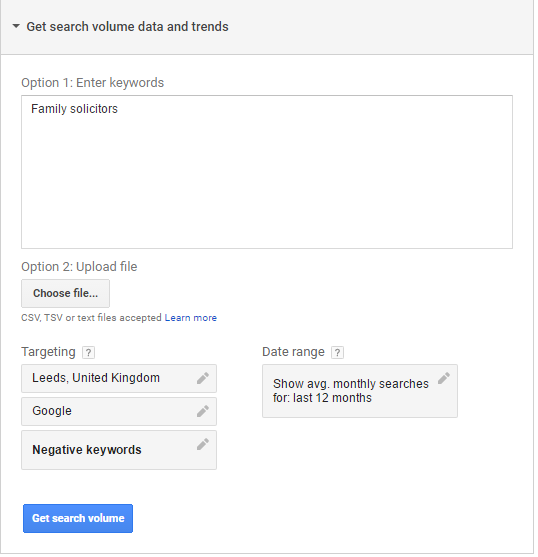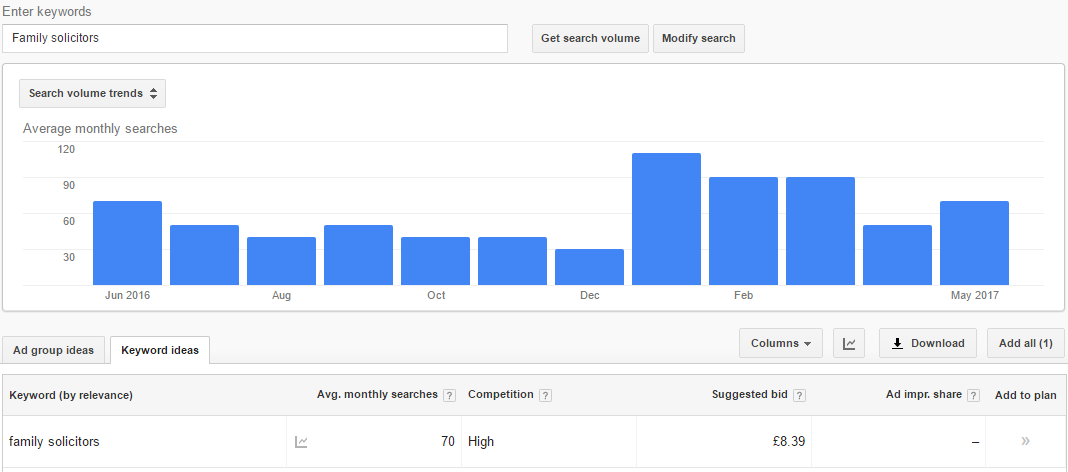3 More Essential Legal Marketing Tools
At LawBid, we work with law firms of all shapes and sizes. From large, high ranking law firms to single partner practices. With different budgets, business models and company cultures, legal marketing plays a different role at different firms. However, we believe that knowledge of basic digital marketing practices can be highly valuable in the competitive legal sector.
With a reported UK digital ad spend of £10.30 billion in 2016, advertising your services online with a modest budget can be a challenge. Therefore, exploring more cost-effective legal marketing methods is essential.
In this article, we will follow on from our Digital Marketing Tools for Law Firms blog post by discussing three more essential and effective legal marketing tools for law firms.
1. Google Keyword Planner
Knowing how your target audience search for legal services online is a fantastic place to start when planning any type of organic or paid legal marketing campaign. The Google Adwords Keyword Planner is a great tool for gaining an insight into what, how and where potential clients search for legal services online.
If, like an increasing number of firms across the UK, your firm uses Google Adwords to drive traffic and target new clients, then you will be able to access the Google Adwords Keyword planner by:
- Logging into your Google Adwords account
- Clicking ‘Tools’ in the navigation bar at the top of the page
- Selecting ‘Keyword Planner’ from the drop-down bar
Once the keyword planner is open, navigate to the section of the page that says ‘Get search volume data and trends’.
Once clicked, it is time to start thinking about the types of keywords you would like to target and the locations in which you would like to target them.

For example, if you are a firm that specialises in offering family law services and you are located in Leeds, knowing how frequently the term ‘Family solicitors’ is searched in the Leeds area will be useful for your firm.
Start by entering a relevant keyword in the text box, then set the location by clicking on the pencil icon underneath the ‘Targeting’ heading.
Finally, click ‘Get search volume’ to get your results.
The results you receive will look similar to those pictured below:

Google Adwords Keyword Planner will display:
- The spread of search volume over the last 12 months in the graph
- The average monthly searches
- The ‘competition’ for the particular keyword. This is calculated by the number of advertisers showing interest in the keyword or phrase entered
- The suggested bid. This is an estimate of the amount an advertiser would be required to bid to be the top result in a paid ad. The information in this section is not strictly relevant to people using Keyword planner for organic research, although it could give you an idea of the money you could save by ranking for certain terms without the use of paid advertising.
Once you are familiar with how Keyword Planner works, try out different variations of relevant keywords. More specific, ‘longtail’ keywords tend to have a lower search volume, but have the advantage of lower competition.
Once you have identified keywords that are relevant, it is time to implement them into the copy on the service pages of your website and produce blog posts to drive traffic to key areas of your site.
2. MailChimp
Company newsletters are nothing new. In fact, you probably receive them frequently from a number of different companies.
Even if your firm already has a regular newsletter, producing one specifically for your department could be a great way to touch base with previous clients and send targeted messages to relevant people. For example, if you are an Employment Solicitor, setting up a newsletter to circulate to your previous clients with relevant information about developments in the world of employment law, the launch of new projects and helpful tips helps brand awareness, reinforces the impression of expertise and could encourage previous clients to return to you in future.
Email newsletters are a great way to:
- Show the human side of your organization by discussing charity, events and company news
- Share relevant content
- Promote offers
- Link to key areas of your company website
As a legal marketing tool, MailChimp is easy to understand and simple to use. Completely free, given that you have fewer than 2,000 subscribers, MailChimp has the double advantage of being cost-effective and highly targeted.
Helpful features like the subscriber list segmentation, personalisation and design templates make MailChimp a must have legal marketing tool.
By using the Reports feature to gather data about the performance of your newsletters you can measure their effectiveness as well as identify subscribers to re-market your services to.
For example, you could produce and distribute an Employment Law information sheet containing facts and figures that business owners would find useful. By looking in the Reports section of MailChimp, you would then be able to identify the subscribers who clicked to download your fact sheet. Once you have identified subscribers who may require assistance with an employment law issue, you could send them more employment related content in the future or send them information about the relevant services you provide.
3. Screaming Frog
Search engine optimisation, or SEO, is a key aspect of any legal marketing strategy. Aimed at increasing organic traffic by optimising your website for targeted search traffic, a solid SEO strategy can save your firm thousands of pounds that would otherwise be spent on paid advertising.
Because Google regularly updates the algorithms that dictate how and why search results are displayed, SEO is an ever changing practice.
Screaming Frog is a great tool for anyone who wants to introduce SEO into their legal marketing strategy. Essentially a website auditing program, Screaming Frog identifies all of the technical aspects of your website that could reduce your chances of ranking for your chosen keywords and phrases.
By ‘crawling’ your website in a similar way to a search engine, Screaming Frog identifies areas of your website where you stand to improve.
A web crawler (also known as a web spider or web robot) is a program or automated script which browses the World Wide Web in a methodical, automated manner. This process is called Web crawling or spidering. Many legitimate sites, in particular search engines, use spidering as a means of providing up-to-date data.
By pulling together information on duplicate content, page titles, meta descriptions and broken links, you can quickly identify the reasons your existing webpages are not ranking. Auditing your website and addressing existing issues first is a great foundation on which to implement a SEO strategy.
With changing algorithms, competition and large budgets to content with, legal marketing can be a challenge. However, with Google now processing around 40,000 search queries per second, maximising your presence online is crucial.
If you are interested in the impact that legal marketing and technology is having on the sector, be sure to check out our blog posts on embracing digital, social media and information overload.


